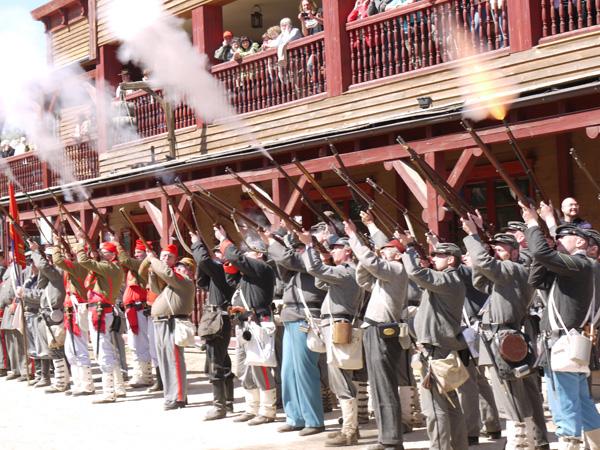Why Germans Like to Reenact US Civil War Battles
Germans reenact the US civil war (Photo: Caitlan Carroll)
By Caitlan Carroll
On a warm spring morning about 50 miles north of Berlin, Union troops and their Confederate rivals prepare for battle. They are camped out for the weekend at a Wild West theme park in Templin.
About 60 people, mostly Germans, are dressed head to toe in 1860s-period clothing. Women wear hoop skirts. The men are in handmade uniforms with lots of colorful piping and brass buttons. A few young soldiers swing their bayonets.
“I’m a simple soldier, a private,” said Tobias Melchurs.
Melchurs, 21, is a business student. But this weekend, he is fighting on the side of the North in two battles – the bombardment of Fort Sumter and the first battle of Bull Run.
Melchurs belongs to one of the several German groups that engage in American Civil War reenactments about once a month.
Like many of the participants here, Melchurs feels a personal connection to the war.
“There were about 200,000 who had German roots that fought in the Civil War,” Melchurs said. “I think it is important for our history.”
Every person I speak with mentions this number: 200,000. Many of the participants actually model their characters in the reenactments after one of these German immigrant soldiers. They say it helps them feel closer to the history.
But a lot of the bloodier and more tragic parts of the war seem glossed over — like the punishing number of deaths and the issue of slavery. Ute Frevert, a historian, and head of the Max Planck Institute for Human Development, said this sometimes happens when people try to re-live history.
“It is more about fantasies,” Frevert said. “That’s fair enough; life needs fantasies.”
And Frevert pointed out that the fantasy of war is not often indulged in Germany. After World War II, any talk of military glory became socially taboo here.
“As a German I have to be hesitant in the post-1945 culture, because wars are not something that Germans are used to finding fascinating and kind of exciting and appealing,” she said.
So for those at the reenactment, it is appealing that the U.S. Civil War took place in another country, in another time. It is safer, even romantic. A lot of fantasies have built up around the Confederacy, thanks to the movie, “Gone with the Wind;” it is a staple of German popular culture.
On the other side of camp, the Confederate soldiers are busy preparing for the battle. More people want to be on the Confederate side, so the Union troops sometimes have to recruit local reenactors from the American Revolutionary War.
Chris McLarren plays a confederate captain from Texas. He is actually an American. He said the Germans are totally immersed in the history.
“The Germans like to do things 110 percent sometimes,” McLarren said. “They are perfectionists in many ways and they want to do this the way it was then.”
Beyond the history, these events also provide something else – camaraderie. Young private Tobias Melchurs said people at school think he is weird to do this. On the weekend, though, he is just one of the guys.
“The battle is one thing, but we all enjoy it to sit at the fire in the evening or late at night,” Melchurs said. “Brothers in arms, yes?”
As we talk, the battle starts. Guns and cannons fire and smoke fills the air.
For these Confederate and Union reenactors, playing war is a safe game in a country that can’t help, but remember.
